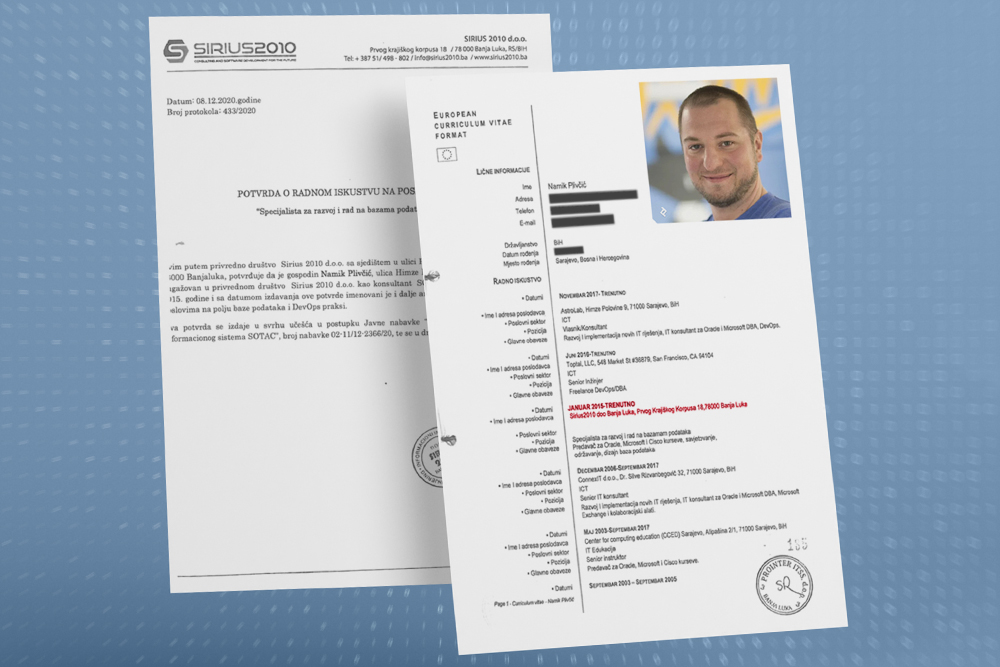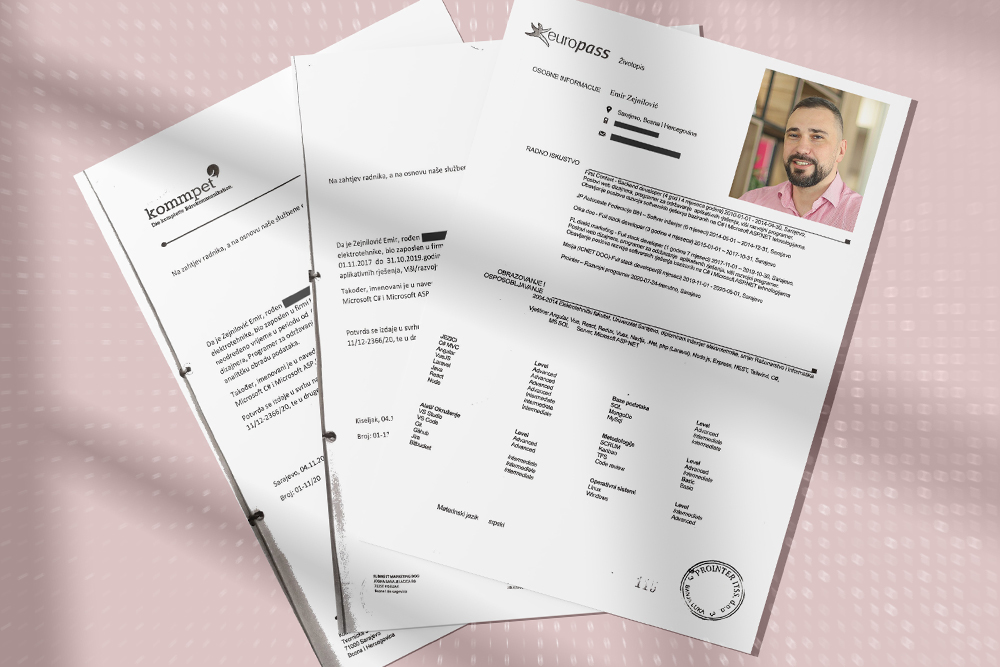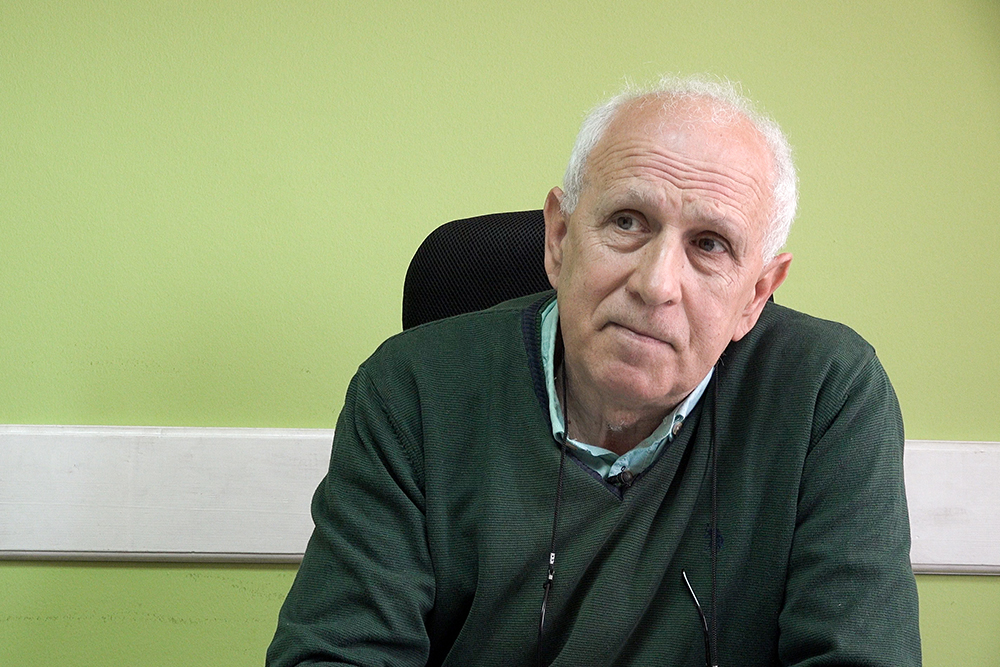- Prointer applied for tenders worth BAM 692,000 with forged documentation
- Prointer making an “indecent proposal” to the competition
- No sanctions for Prointer despite the report
After a series of multimillion-dollar contracts with the institutions in Republika Srpska (RS), at the end of 2020, the company “Prointer ITSS” embarked on a quest after valuable public tenders in the Federation of Bosnia and Herzegovina (FBiH). The company tried to pull the deal with the Federation Ministry of Labor and Social Policy in two tenders for information system maintenance worth BAM 692 thousand.
They tried to beat the competition by submitting falsified documents, bribing, and blackmailing.
“Prointer” was supposed to submit to the tender commission proof of having experienced experts on board who would maintain the complex information systems for the Ministry. However, as they did not have enough experts, they indicated two experts in support of whom they attached forged documents about their work experience and CVs. Even though the Ministry was required to verify the documentation, they failed to do so, hence “Pointer” was admitted as an applicant.
“Some documents have been enclosed on my behalf. “The things written there are absolutely untrue”, said Sarajevo developer Namik Plivčić. His name ended up on the forged documents.
Adnan Mujkić, a worker of Prointer at the time, at his boss’s behest offered Plivčić money for the necessary certificate, which they both confirmed to the journalists. Prointer denies offering money.
Suspicious documents from the tender documentation did not escape the eye of the Sarajevo company “COMP-IT”, the only bidder alongside “Prointer” in the final competitive bidding for the tenders.
“Fifteen minutes before the auction we received a call from Bojana (Bojana Škrobić-Omerović, author’s note), the executive director of Prointer telling us that they would not be bidding if we agreed to take them as a subcontractor and pay them. She blackmailed us”, the owner of this company, Bakir Začiragić, told reporters.
“COMP-IT” eventually won the tender, but they lost about BAM 270 thousand due to the Prointer’s undercut. They warned the Ministry about the Prointer’s suspicious documentation, which the Ministry referred to the investigative bodies.
Although initially the new director of Banja Luka’s Prointer, Vladimir Perišić held that not responding to these allegations would go against them, he later declined our calls.
It has been more than a year since the evidence of forgeries was presented but no sanctions were imposed on “Prointer”. The company since contracted more than BAM 57 million worth of work for public institutions in BiH, of which less than half a million BAM in the FBiH.
A EUR 200 Worth Service
In 2020, the FBiH Ministry of Labor and Social Policy announced tenders for the maintenance of social benefits payment software (SOTAC) worth nearly BAM 479 thousand and the Single Register worth about BAM 213 thousand.
SOTAC is used by the cantonal and municipal social welfare services in the FBiH to calculate and pay benefits. The system is linked to the Agency for Identification Documents, Registers, and Data Exchange of Bosnia and Herzegovina (IDDEEA), the FBiH Tax Administration, and about thirty banks. SOTAC is also connected to the Single Register, which serves for the payment of fees from the budget. These two systems hold the personal data of nearly two million citizens of the FBiH.
Maintaining this software requires collaboration with more than a hundred FBiH institutions and at least 450 of their employees. For almost two decades, these tasks have been performed for the Ministry by the Sarajevo company “COMP-IT”, which is very familiar with the software because it was involved in its development. The SOTAC application was developed in 2003 by a consortium of companies “COMP-IT”, “Ocean” from Travnik, and “Lanaco” from Banja Luka. Following its launch, the companies agreed that “COMP-IT should be responsible for its maintenance in FBiH, and the Banja Luka company in RS.
“Having the company that developed it also maintains it is the only right thing. It would be very risky for the contracting authority to hire someone else. If materialized, this risk would lead to people not receiving benefits, say, for half a year”, said Senid Gerin, owner of “Ocean”. “Lanaco” refused to answer journalistic questions.

The owner of “COMP-IT” Bakir Začiragić claims other companies have never offered their maintenance services to the Ministry because they do not know the software nor did they have people trained to use it.
Začiragić hoped to continue cooperation with the Ministry in 2020, but this time“Prointer” as well applied for software maintenance tenders.
“We were surprised,” said Začiragić, adding: “It was illogical to have someone else take your software, learn about how it works to be able to maintain it. The system is not at all that simple. No smart company would do that.”
“Prointer” had no problem with that. To prove its capability to maintain this system, it was supposed to present to the Ministry a list of five experts who could do the job. The first on the list was developer Namik Plivčić. Prointer described him as a database development specialist.
However, Plivčić told CIN reporters that he had never cooperated with this company before, nor had he talked to their executives about maintaining the software. According to his account, at the request of his friend Adnan Mujkić, who worked for Sarajevo’s Prointer in 2020, he shared with him his CV (Curriculum Vitae) and the Microsoft certificate requested under the tender.
“Then he asked for some evidence of my previous experience. I could not accommodate his request. I told him that I gave him all that I had”, said Plivčić.
However, the statement about his professional experience was made without his knowledge. The document says that Plivčić has been employed by the Banja Luka company “Sirius 2010” as a database consultant since 2015, although he has never worked for this company. It was signed by the “Sirius” executive Duško Opajić, and “Prointer” incorporated it into the tender documentation to prove that the company has a database specialist with five years of experience. Plivčić’s CV was added to corroborate the forged document.

“My first mistake was that I’ve naively got into it. I wanted to help a friend who played me”, Plivčić said.
Journalists caught Mujkić by surprise with a question about Plivčić’s CV. He kept saying that he could not imagine anyone forging it on its way to the Ministry. He confirmed to have known Plivčić for years and that he has never worked at Sirius.
“Namik was offered money to borrow them his certificate. I offered him EUR 200 on behalf of the company. My manager said that he would pay EUR 200 to anyone who borrowed us the certificate”, said Mujkić, who stopped working for Prointer in mid-2021.
Yet, the executive of Sarajevo’s Prointer, Bojana Škrobić-Omerović, stated in the tender statement that she offered no bribe, gift, or any other privilege to anyone in the public procurement process. She did not respond to calls from CIN reporters.
Plivčić claims to have refused to take EUR 200. Upon learning of the forged documents with his name on them, he informed the Ministry in writing that he had never worked for “Sirius 2010”.
“I was very upset. I’ve been in the IT industry for almost 20 years. I have a reputation, I have an image, and then someone puts it all at stake”, says Plivčić.
Duško Opajić, executive of Sirius, did not respond to calls from reporters either.
Prointer was one developer short to meet the requirements of both tenders. CIN reporters found that documents with false information about the experience of developer Emir Zejnilović were also found in Prointer’s documentation.
At the time of applying for tenders, Zejnilović had been an employee of Prointer for only a few months. Although he had no evidence of work experience, he tailored the document to meet the conditions from the public calls. The false certificates were signed by his cousin Faruk Zejnilović, director of the IT companies “FL Direct Marketing” and “Kommpet”. According to the certificates, Emir Zejnilović was an employee of these companies for six years, which is contrary to official data from the Register of employees in FBiH.
Emir and Faruk Zejnilović agreed to meet and talk to CIN reporters but refused to speak officially due to the ongoing investigation. The FBiH Police Administration prepared a report on certificate forgery and forwarded it to the Cantonal Prosecutor’s Office in Sarajevo in late 2021. This institution is checking the application, as they said.

Blackmail For Victory
Although the Tender Commission of the Ministry was obliged to ask Prointer for evidence issued by the Tax Administration and the FBiH Pension and Disability Insurance Fund on the length of service of the employees based on which it could have established that the documents were false, it failed to do so. Yet, the Commission did check the certificates presented by competitor “COMP-IT”.
These two companies ended up bidding for both tenders.
The owner of “COMP-IT”, Bakir Začiragić, claims that 15 minutes before the auction for the first tender, the executive director of Prointer from Sarajevo, Škrobić-Omerović, offered to withdraw Prointer from the auction if “COMP-IT” would take them as a subcontractor. According to him, she “practically blackmailed” him.
“We refused and then they stripped our price by 40%,” said Začiragić. At the competitive bidding for the second tender, “COMP-IT” again accepted the job for 40% less than the original price. Thus the company lost about BAM 270 thousand in both tenders.
“We demanded that their offer be annulled. The Ministry did not cancel the auction, although it was ought to do so”, says Začiragić. According to the regulations, the contracting authority must decline the request of an applicant to participate in the tender if such applicant provided false information on the fulfillment of the conditions.

According to Začiragić, after he reported “Prointer” to the Ministry, the then director of Banja Luka’s “Prointer”, Gordana Kovačević, paid him a visit.
“In principle, she asked us to withdraw the papers,” said Začiragić, adding that they refused to do so.
Prointer did not want to explain the misrepresentations in tenders. In their written response, they stated: “Everything we submitted in the public procurement procedure was considered in line with the defined procedures.”
The Ministry persistently refused to speak to journalists on this matter: “This Ministry will not make any comments or give statements before the competent authorities complete the procedure.”
After Začiragić filed a report, the FBiH Minister of Labor and Social Policy Vesko Drljača responded with a written decision stating that “they could not go into whether certain companies forged certificates, considering that each certificate was signed and verified by the company seal.”
However, according to the BiH Public Procurement Act, the contracting authority is obliged to check the qualifications of bidders, i.e., the validity of documents submitted by bidders in their tenders.
“Someone can deceive you and that is inevitable, but you are ought to check. The contracting authority has all the powers to call the authority that issued the certificate. All the doors are open to you. That brings us to the question of whether the contracting authority wants to do that”, says lawyer Nermin Vila.
However, the biggest responsibility is born by the person who made a false certificate and deceived someone with it, and on the one who used such a certificate, adds Vila.
Hidden Interest
“Prointer ITSS” was founded in April 2015, and the same year they concluded deals with institutions worth BAM 215 thousand. In the next seven years, the institutions in BiH entrusted this company with jobs worth BAM 167 million. Most of the work was contracted by RS institutions and public companies.
In 2019, this preference of the RS institutions for Prointer was questioned at the session of the RS National Assembly, where the member of the Presidency and leader of the Alliance of Independent Social Democrats (SNSD) Milorad Dodik was asked if his son Igor was the real owner of Prointer.
“He is neither the owner nor an authorized person, but he is an associate of that company. He deals with new technologies, cooperates with foreign companies, and makes income from that,” said Dodik at the time.
At the beginning of 2022, the American technology corporation Microsoft removed Prointer from the list of its partners. The decision came after the United States imposed sanctions on Dodik for corruption and amassing personal wealth and undermining stability in BiH.









